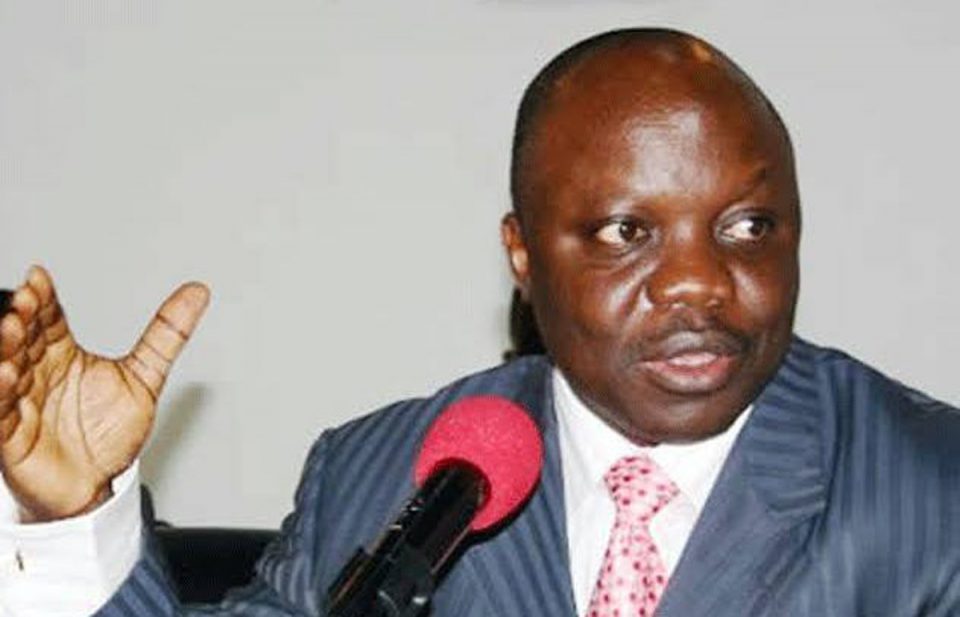*Urges FG to make seaports in Niger Delta operational
Immediate past Governor of Delta State, Dr Emmanuel Uduaghan, has said there could not be a part of Nigeria that is a no man’s land, insisting that offshore areas belong to the states.
Uduaghan who stated this while delivering a lecture titled: “Niger Delta Economy: Building a new face for the region,” organized by the Delta Online Publishers’ Forum (DOPF) to mark its third anniversary, decried a situation where the Niger Delta which has limited land space is denied the benefit of its water space which the Federal Government has declared a no go area by the states.
He said a major way to build a new face for the Niger Delta was to embark on urgent diversification of the region’s economy, adding that such diversification must be in the area of establishment of industries, human capital and infrastructure development through a concerted effort of stakeholders towards redeeming the lost glory of the region.
While commending DOPF members for inviting him to give the lecture, which he described as a nice programme, he held that the theme of the lecture was quite clear as it points out that building a new face for the region implies that there was an old face.
Uduaghan said the diversification was needed to pull the region out of the red zone of youth restiveness and insecurity, stressing that the issue of coming out of the red zone depended greatly on the federal and state governments for the purpose of harnessing the economic potentials of the region to benefit the people.
The erstwhile Governor said among the injustices meted on the region was the point in which people from other regions come to enjoy the work facilities provided by the oil resources of the region but don’t reside in the states of the region thereby not paying tax due to them to the states.
He said: “We have a lot of people in Escravos working in Niger Delta but they are paying taxes to governments outside Niger Delta.
“We are being oppressed year-in-year-out in the region. Persons brought from outside Niger Delta for NYSC are given employment opportunities, especially those from the south-west, leaving Niger Deltans out”.
He argued that for the region to wear a new face, concerted effort was needed to diversify the economic fortune of the region to viable areas of human endeavours, using the proceeds from oil to build infrastructures so as to stimulate boom of other areas of the economy.
He explained that this was the idea that informed his administration’s three-point agenda of “Peace and security, human capital and infrastructure development”, pointing out that “his administration’s mantra of Delta Beyond oil is a programme that will go beyond the life span of any government.
“We are talking now of Niger Delta Beyond oil, we need to build critical infrastructures that will stimulate economic activities that are not oil related like railroads, among others”, adding that “the Niger Delta states must put up policies to stimulate economic development”.
While calling for sustained engagement in human capital development in the areas of acquisition of knowledge, Uduaghan said: “Knowledge has a lot of benefits and education is very key. A society where the people are not educated, I term them as people who are facing disaster.”
To this end, he called for more investment in human capital development programmes/initiatives on prospective youths and women, saying; “Niger Delta is well geographically positioned and endowed with human and natural resources.
“Nigeria ranks fourth among cocoa producers in the world, and the Niger Delta region produces 53 per cent of the country’s output.
“It is an important crop–earning non-oil foreign exchange. Cross River, Ondo and Edo states are the leading producers in the Niger Delta Region, producing about 97 per cent of the region’s cocoa.
“Yet, the major processing for cocoa is in Western Nigeria, around Lagos, so major value addition takes place outside of the Niger Delta region because the region has no industries.
“We have been very hostile in the Niger Delta to investors. I hope we can improve on our reception to industries coming to the region. We must be hospitable to industries.
“We must encourage people to have large scale farms in rice, sugar cane, cocoa, roots and tubers, citrus fruits, plantain, rubber, even as the region is blessed with many resources for aquaculture and forestry”.
Uduaghan who spoke further, said cultivation of industries related to these products deserve the active and collaborative support of the state governments, oil and gas companies and other stakeholders in the region.
He said: “We need the air, waters and soil of the Niger Delta; there has to be a lot of environmental remediation in the Niger Delta because we don’t have land, decrying the moribund state of the ports in the region”.
Uduaghan tasked the Federal government to open up the ports in the region to attract investors, explaining that would bring employment and stem criminality in the nation.
Lamenting that the ports in Niger-Delta have been of sub-optimal performance, he told the Federal government to carry out environmental remediation of the oil-polluted land and rivers of the region in line with relevant laws.
He noted Niger-Delta region was an agrarian area where its people depend on it for source of livelihood.
While paying growing tributes to the contributions of ex-militant leader, Mr Government Oweide Ekpomokpolo, aka Tompolo that has brought government attention to the region, he called on all stakeholders in the region to be persuasive in their approach to allow investors into the region.




